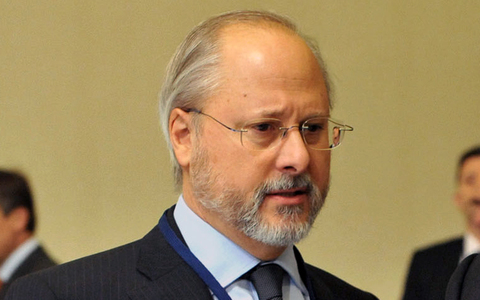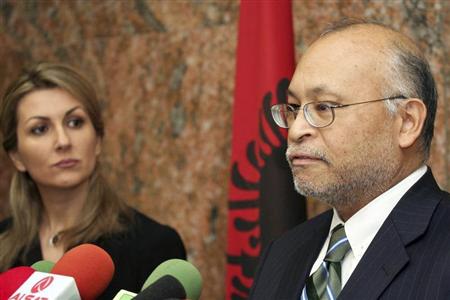A Reporter at Large
Bring Up the Bodies
Kosovo’s leaders have been accused of grotesque war crimes. But can anyone prove it?
by Nicholas Schmidle

Hashim Thaci, the
Prime Minister, helped lead the Kosovo Liberation Army during the war.
He says, “The K.L.A. was big, and you always have abusers in such
organizations.” Photograph by Alex Majoli.
After the conflict in Kosovo
ended, in June, 1999, a tribunal in The Hague set out to punish the
perpetrators of atrocities. Louise Arbour, the lead prosecutor,
described Kosovo—a former province of the Federal Republic of
Yugoslavia—as “one vast crime scene.” Her investigators’ primary target
was Slobodan Milosevic, the Serb who led Yugoslavia. Milosevic had
claimed that Kosovo’s majority group, ethnic Albanians, treated ethnic
Serbs like slaves, and armed forces under his control had waged a
campaign of mass murder there, slaughtering more than ten thousand
Kosovars. NATO, relying heavily on
American forces, launched air strikes to stop Milosevic, and received
crucial assistance from the Kosovo Liberation Army, the main rebel force
in the region. K.L.A. scouts relayed Serbian tank coördinates to Green
Berets, who passed on the information to American fighter jets. Three
months after the air strikes began, Serbia surrendered. Milosevic was
eventually arrested and sent to The Hague, where he died in prison, of a
heart attack.
In Kosovo, meanwhile, the K.L.A. officially
disbanded, but many of its members joined political parties. A party led
by Hashim Thaci, the K.L.A.’s political chief, rose to power. In 2008,
Thaci became the first Prime Minister of an independent Kosovo. Two
years later, Vice-President Joe Biden hailed him as “the George
Washington of Kosovo.” Today, nearly two thousand people remain missing in Kosovo, a country that José Pablo Baraybar, a Peruvian who headed the U.N.’s Office on Missing Persons and Forensics, described to me as “one of the most exhumed places on earth.” DNA technology has helped investigators identify hundreds of bodies, many of them buried in mass graves. But, even in an era of sophisticated forensic science, definitive evidence can be elusive: in one case, the Serbs burned hundreds of corpses in a lead smelter.
Dozens of Serbs have been convicted of war crimes since the fighting stopped, but they were not the only ones responsible for violence. In Pristina, the capital of Kosovo, rumors circulated that, in the summer of 1999, K.L.A. paramilitaries had trucked prisoners across the border to secret detention camps in Albania, where they were tortured and, sometimes, killed. But, in public, Kosovars embraced a “silence taboo,” in the words of Vehbi Kajtazi, a journalist in Pristina. The men who led the K.L.A. remained a fearsome presence in the country, posing a threat to anyone who spoke out, and ethnic Serbs were a powerless bloc, falling to less than two per cent of the population. Unlike Argentina, South Africa, and Sierra Leone, Kosovo failed to establish its own truth-and-reconciliation commission.
The task of accounting for the missing was left largely to outsiders. One of them was Michael Montgomery, an American radio journalist who had helped expose the massacre of forty-one Kosovar Albanians by Serbian forces in the village of Qyshk, on May 14, 1999. He began amassing troubling stories involving the K.L.A. Multiple sources told him that, in the days after Milosevic’s defeat, the K.L.A. had shipped accused traitors to camps in Albania. A former K.L.A. member recalled guarding seven prisoners in the back of a van, their mouths taped and their hands cuffed, as they crossed the border. A K.L.A. driver said that he had been given orders not to hurt anyone; once his captives were in Albania, they were taken to a house where doctors were present. The driver heard that the doctors sampled the prisoners’ blood and assessed their health. Several sources implied that this caretaking had a sinister purpose: the K.L.A. was harvesting the prisoners’ organs and selling them on the black market.
Montgomery was concerned that these stories might be propaganda planted by the Serbian government, so he tracked down additional sources. Three people recalled taking prisoners to a yellow house outside the Albanian town of Burrel. Another K.L.A. driver told Montgomery that there were only two places where he “brought people but never picked anyone up”: the yellow house and a cream-colored farmhouse near the airport in Tirana, Albania’s capital. The farmhouse, he noted, had a “very strong smell of medicine.” The driver added that he sometimes heard other drivers talking about “organs, kidneys, and trips from the house to the airport.” Since the late nineteen-nineties, Istanbul—a short flight from Tirana—has been a destination for transplant tourism.
more see: http://www.newyorker.com/reporting/2013/05/06/130506fa_fact_schmidle


































